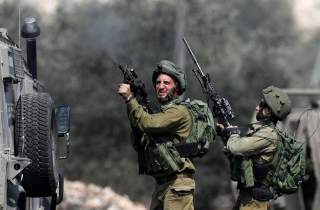Does a Two-State Solution Still Exist?
The Arab Spring caused dramatic changes and created new regional realities.
• Sketchy government services and a “fauda” political system have contributed to preclude building a state on the ground and perpetuated the sloping status quo. However, remnants of the PLO and the PA serve an important function of keeping Palestine alive as a national issue rather than a refugee issue, which keeps the two-state solution viable.
• The current leadership lacks the political or moral authority needed for compromises on the “Final Status Issue.” All are labeled “Palestinian Constants” to be delivered by someone: The United States, international community, Arabs, or (perhaps fancifully) a conciliatory Israeli government.
• Relentless settlement building has left an ever-shrinking space for the future Palestinian state. Calls for a one-state solution are in part expressions of despair of the viability of a Swiss-cheese state.
• The politically and geographically divided Palestinian polity includes Gaza run by Hamas. There are no clean hands on this issue and none of Gaza’s tunnels leads toward a light at the end. Outside Arab intervention remains the best way out of Gaza’s predicament.
• The world, the United States, Arabs and Muslims are overwhelmed dealing with complex issues but, despite all claims to the contrary, this conflict about the Holy Land will get attention. Its priority ebbs and flows, but it persists because of religion.
Where Do We Go from Here?
Regional and geopolitical realities could not be less conducive to conflict resolution. No party has the credibility, political capital or will to resolve final-status issues. It is time to seek an achievable goal. Absence of negotiated conflict-ending solutions does not mean ending negotiations. The opposite is true. It is time for a policy focused on removing impediments to a negotiated deal. This proposed policy is not about an interim agreement. Let us call it the “What can be done during the transition?” phase. The two parties cannot do it by themselves. Only the United States has what it takes to oversee this phase and have its allies help provide oversight.
By focusing on the transition phase, good governance must top the agenda to build Palestinian infrastructure. Beautifying the occupation is an odious concept, but building institutions and better living conditions is an empowering noble objective. Good governance is about implementing rule of law to protect the rights of citizens. It is expected to establish health, education, transportation, institutions and services. It is supposed to provide jobs, build an economy and enhance trade cooperation and mobility. Working on these goals cannot wait till final-status issues are resolved. Palestinian self-empowerment is a prerequisite for future stability. Donors must respectfully insist that mechanisms are in place for the international community to oversee projects and progress to the highest standards of accountability and transparency. Former Prime Minister Fayyad’s short-lived infrastructure-building program was showered with praise and accolades, but hobbled by lack of political and financial support. Still, it provided a prototype.
The infrastructure-building transition phase is meant to impact Palestinian lives as well as Palestinian and Israeli politics. The single most effective weapon against terrorism is good governance with good education as its top priority. Occupation is incompatible with stability. The word “normalization” is reviled by many Palestinians and Arabs who consider it to truly mean “surrender” and “betrayal.” However, normalization is a two-way street. Palestinians do not lead normal lives under occupation. They would be the main beneficiaries of normalization. Israelis will not lead normal lives and continue the occupation.
Finally, the Arab Spring caused dramatic changes and created new regional realities. Assumptions must be reexamined and new options studied for their impact on this conflict. Conflicts and problems of all regional states are interconnected, because everyone plays in everybody else’s court. Terrorism will wreak more havoc before it is defeated. Strategic solutions, including a Middle East security regime equivalent to NATO, could be considered to stabilize the region in order to fix its many deficits. Alliances and interests across the region intersect, including with Israel and Palestine.
Historic statesmen of vision and vigor are yet to deliver on a peaceful future for this region of turmoil.
Ziad Asali is the president and founder of the American Task Force on Palestine. This article is based on remarks delivered at a Sept. 10 symposium at The Crown Center at Brandeis University.
RECOMMENDED:
What a War Between NATO and Russia Would Look Like.

